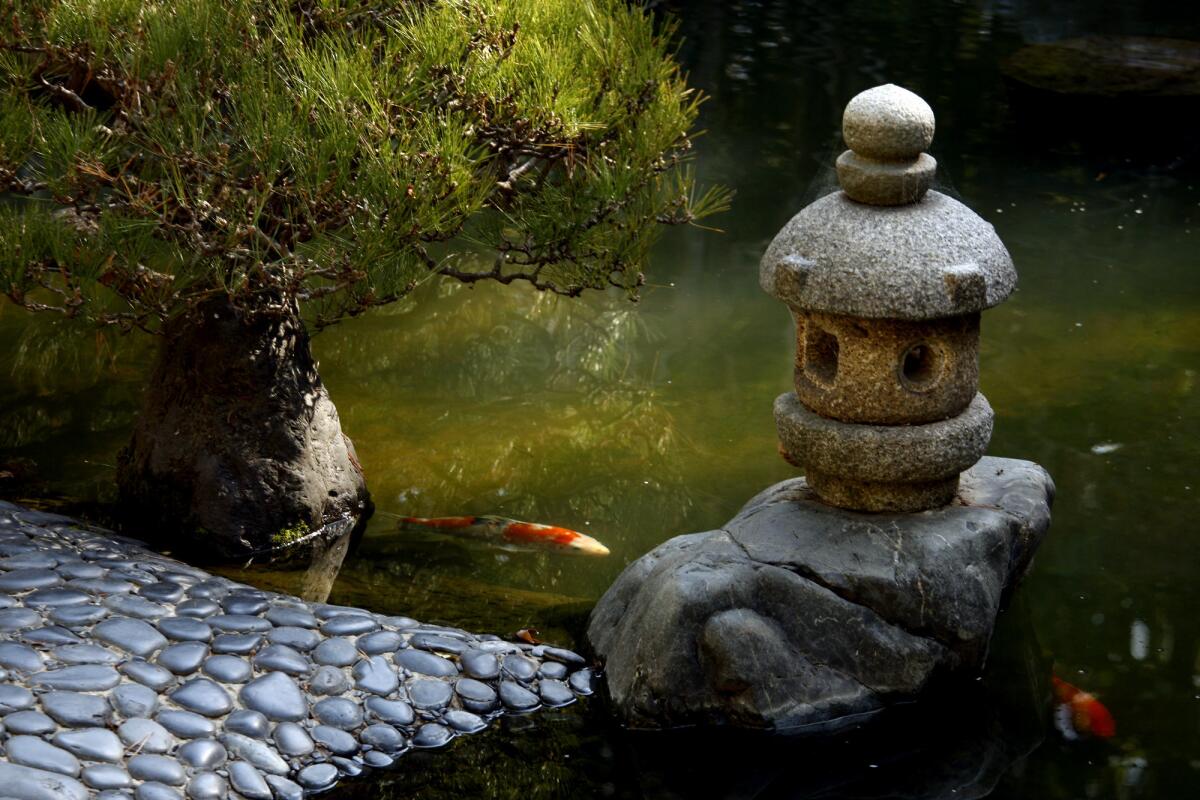UCLA and Hannah Carter heirs settle suit over Japanese garden in Bel-Air

Koi swim in 2012 near a smooth pebble path at the Hannah Carter Japanese Garden in Bel–Air.
- Share via
UCLA said Wednesday that it has settled a long-running legal dispute over a donor’s gift of a house and Japanese garden in Bel-Air.
Under the agreement, UCLA will be allowed the sell the property near the Hotel Bel-Air on the condition that the new owner agree to preserve the garden for at least 30 years.
Experts consider the garden, which contains streams, a waterfall, tea house and blooming magnolia and camellia trees, to be one of the finest examples in North America of a landscaping style meant to inspire Zen-like tranquility.
The new owner would not be required to open the garden to the public, but both sides said they hoped a new owner would seek a conservation easement and arrange for at least limited public access.
In 1964, Edward W. Carter, a former UC regent and the man who built the Broadway department store chain, and Hannah Locke Carter, his second wife, gave UCLA their Georgian Colonial house and the Japanese garden that cascaded down the hillside below. The UC regents, UCLA’s governing body, promised to maintain the garden forever.
Decades ago, UCLA opened the garden to visitors on a limited basis, and thousands of people explored it.
In 1982, the Carters agreed that proceeds from the sale of their house would be used to fund certain endowments and professorships. Edward Carter died in 1996. Hannah Carter vacated the house in 2006 and died in 2009.
The next year, the UC regents asked the Superior Court in Alameda County, where the University of California is based, to allow the properties’ sale by auction and to lift the “in perpetuity” requirement. The court agreed.
In May 2011, the university closed the properties to the public. Months later it announced plans to auction the two acres containing the house on Siena Way and the garden on Bellagio Road. It set minimum bid prices of $9 million for the resident and $5.7 million for the garden.
Hannah Carter’s children sued. In 2012, a Los Angeles County Superior Court judge concluded that UCLA and UC officials had behaved in a “duplicitous” manner by failing to notify the heirs of their plan to sell the garden. He ordered a temporary halt to the sale.
In arguing their side, Hannah Carter’s heirs said the university risked alienating potential contributors by reneging on its written promise.
Early this year, an attorney for the regents said “a settlement was always on the table.” He said the university was spending about $200,000 annually to maintain the garden, atop substantial amounts for repairs.
Both sides expressed satisfaction with the settlement.
“We appreciate the Caldwell family working with us and finding a resolution that I think will serve their mother’s legacy and the university well,” said Kevin Reed, vice chancellor of legal affairs for UCLA. He said the university had agreed to reimburse the family $400,000 in legal fees.
“The key realization that we came to quite a long time ago is that the garden has a better chance of survival in private hands than in the hands of UCLA,” said Jim Caldwell, one of Hannah Carter’s five children, who lives in Northern California.
The garden was commissioned in 1959 by oilman Gordon Guiberson and his wife, Verabelle. Architect Nagao Sakurai of Tokyo (known for designing the Japanese government’s Imperial Japanese Gardens at the Golden Gate International Exposition in San Francisco) and garden designer Kazuo Nakamura of Kyoto created the setting. The garden was completed in 1961 but underwent a restoration in 1969 after heavy rains eroded the hillside.
Twitter: @MarthaGroves
More to Read
Sign up for Essential California
The most important California stories and recommendations in your inbox every morning.
You may occasionally receive promotional content from the Los Angeles Times.











